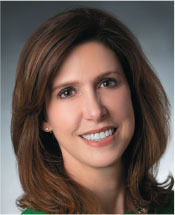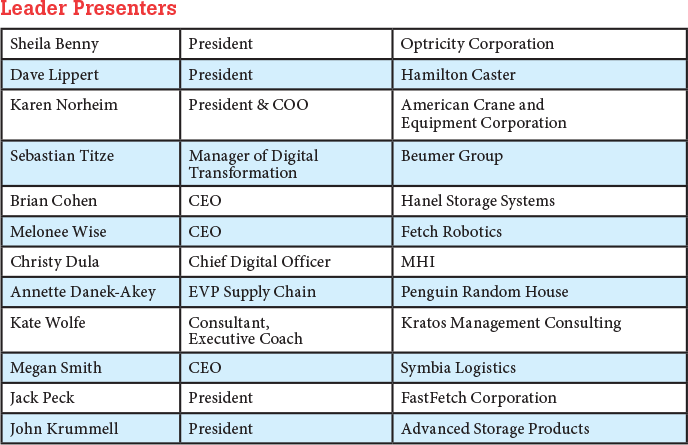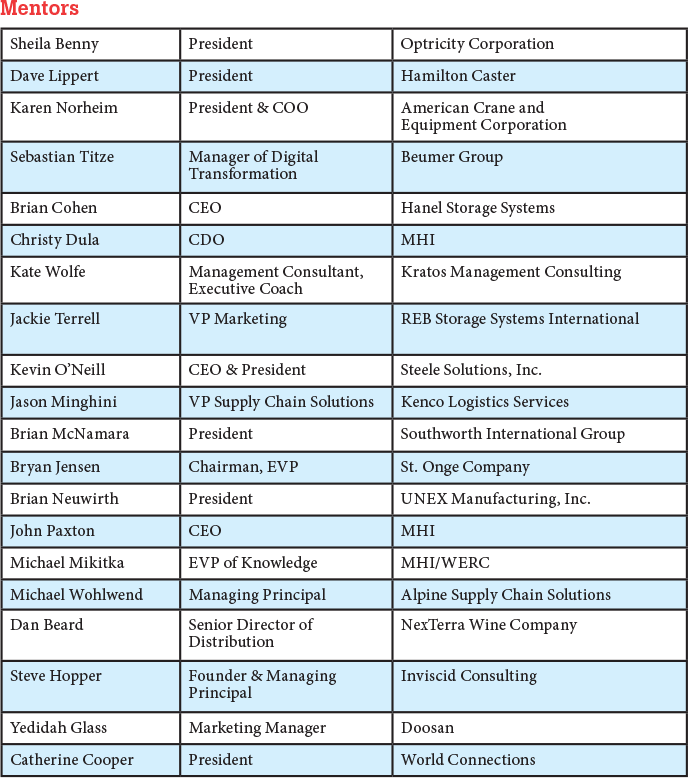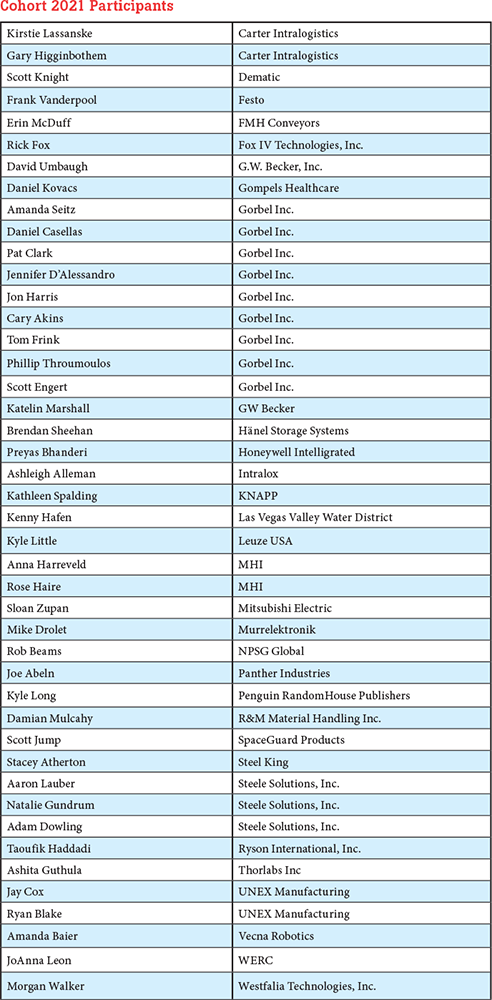
Link to article in digital version of MHI Solutions.
Automation, robotics, constant change and a global pandemic mean transformational guidance is needed more than ever. As a result, strong leadership capabilities at all levels have never been more integral to a business’s success. The future environment of the supply chain and material handling industry requires new skills and experiences for current and emerging leaders.
The competency model for leadership is expansive, making it difficult to design learning experiences that prepare leaders for what they truly need.

The Center for Creative Leadership has distilled the most critical knowledge, skills and abilities into a framework of four key areas.
- Self Awareness to understand how your behavior impacts the outcomes of the organization.
- Communication to provide vision, communicate goals and inspire trust.
- Influence to gain buy-in, persuade, promote and delegate.
- Learning Agility to continue learning and identifying when to change course and help others do so.
The post-COVID world has expanded the framework to include curiosity, resiliency and an inclusive mindset. Soft skills continue to be the most desirable skills for a leader. However, influential leaders must not only master soft skills. They must own their professional development and gain the skills that will give them career endurance.
From now on, in this new, hybrid world, leadership skills and development programs will need to be flexible and available in multi-modal formats. Furthermore, leaders need to be able to apply learnings immediately. Organizations can bridge this gap by providing opportunities for leaders to practice thinking in more complex ways and prepare leaders for the collaborative, network-centric leadership style required. The future leader will always be learning, seeking feedback and calibrating. So, it should be no surprise that coaching leaders to embrace and leverage new skills has become essential. Leaders at all levels need coaching and mentoring to continue to hone their skills, improve their EQ and embrace empathy with their team. As John Paxton, CEO of MHI, states: “Sports teams practice all the time before the big game. In business, I would argue that people do not practice nearly enough. If you want to improve in sports, you have to practice. The same applies to business. Leaders and their teams need constant professional development to practice and improve the business.”
Understandability training has a financial and operational impact when leaders step away from day-to-day responsibilities. However, the benefits—such as greater well-being, reduced absence and increased retention—connect training with the value of improved performance and more significant company ROI. The gap for companies is providing leadership development that matches the realities of their environment. Models and tools are helpful but learning from others and hearing how both peers and senior leadership handle stress, daily demands and challenges are learning points that extend outside of a classroom.
How do leaders want to learn? First, they want expert advice from seasoned leaders who can share their knowledge through stories, lessons learned and advice. Second, rather than delivering this information in a lecture format, leaders who can be vulnerable with their leadership experiences, raise questions, and challenge traditional models will motivate participants to apply their insights and knowledge to their leadership journey. Third, a network of resources—learning peers, mentor leaders and connections outside their company. Fourth, the opportunity to put the knowledge, skills and behaviors into practice. Finally, commitment from their leadership to step away from responsibilities to be fully present for the training.

To meet these leadership gaps and continue to provide value-added member benefits, MHI launched the MHI Industry Leadership Program in 2021.
The 14-week virtual leadership experience is designed to offer weekly real-time learning and networking with peers and industry leaders through a concise, cost-effective delivery. The multi-faceted approach includes self-assessments, online resources, coaching and collaborative learning through interactive exercises with breakout room discussions, polling, online games and an online business simulation.
Initially, the program was intended for face-to-face delivery, but COVID-19 changed that. The result, however, is a learning experience with the same benefits of an in-person delivery. In addition, as a bonus, participants who would not typically be able to step away from work commitments or, in the case of one international participant, leave the U.K., could participate in the weekly virtual workshops.
The real differentiator of the program, however, is the involvement of the WERC and MHI members. As leaders leading leaders, these senior leaders volunteer their time as mentors or presenters in the weekly workshops. Through the generous leadership volunteer cadre, participants in the MHI Industry Leadership program hear leadership stories from company CEOs, presidents and fast-tracked young leaders. For example, a 30-minute fireside chat-style session with the CEO of one of the most innovative robotics companies in the industry was the equivalent of a VIP ticket, as one participant put it. Michael Mikitka, EVP of Knowledge for MHI and WERC, summed up the power of leveraging the extensive leadership expertise of our members. “The MHI Industry Leadership Program embodies the power of associations like MHI. Members are teaching members!”




For both the leader volunteers and the participants, the extra time and effort to participate in the program provides rewards beyond learning and giving back. For example, Daniel Casellas, a plant manager at MHI member Gorbel Inc., brainstormed with his mentor his upcoming interview for a promotion during the program. “MHI is not about learning. It’s about exploring possibilities and providing a path for individuals to discover new prosperities,” said Casellas. And, yes, he got the promotion.
As a leader presenter in the coaching workshop, Sheila Benny, president of Optricity Corporation, which offers warehousing optimization, design and analysis software solutions, shares her wins and losses with coaching in her leadership career. Even as an experienced leader, Benny knows that continuous learning is still vital at her level. “Leadership, like the dynamics among people, is constantly evolving. To truly be a master of a craft, we must forever be a student. That’s why I strive for continuous improvement through learning in my pursuit of becoming a better leader. Supporting my passion for challenging my thinking, I believe that rigorous leadership requires a commensurately rigorous effort on an ongoing basis,” said Benny.
But the ultimate success for the participants is how they implement what they have learned back on the job, or as John Paxton states in an online video lesson for participants, “The ultimate measure of success is your customers. They dictate how well you are doing.”
MHI and WERC would like to thank these leaders for volunteering their time and expertise to the inaugural MHI Industry Leadership Program.
To learn more about this program, contact me at [email protected] or visit werc.org/page/LeadershipProgram.
 MHI Solutions Improving Supply Chain Performance
MHI Solutions Improving Supply Chain Performance